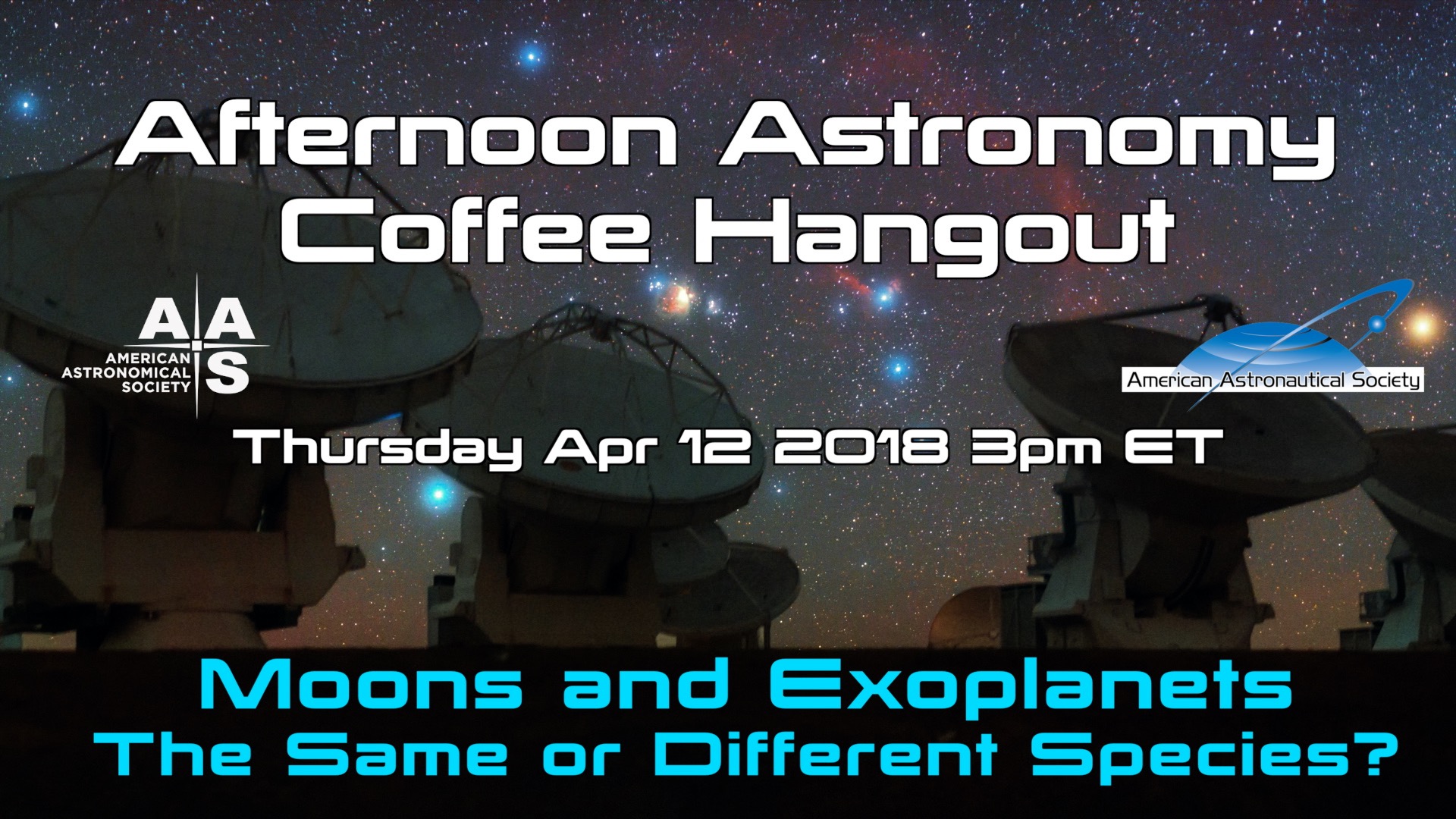Afternoon Astronomy Coffee Hangout 12 April
Carol Christian STScI
"Moons and Exoplanets: The Same or Different Species?"
The search for exoplanets began more than 30 years ago, and once evidence for these objects began to accumulate, the number of confirmed planets has increased dramatically. As the surveys and searches continue, the plethora of types of exoplanets also has become fascinatingly diverse. Having discovered the "hot Jupiter" type of planets, researchers are now looking for smaller and colder objects. Taking a lesson from our own solar system, it does appear that things that might qualify as planets elsewhere might be moons in our own system. Two examples include Saturn's moon Titan and Jupiter's moon Ganymede — these objects may harbor water and conditions conducive to life (not on their surfaces, but in subsurface oceans). What if we found such objects around other stars? We probably would call them planets if they orbited the star rather than another planet. What is it that qualifies an object as an exoplanet, and what types of distant objects might actually be able to support some sort of life?
Join regular hosts Tony Darnell and Carol Christian during Afternoon Astronomy Coffee on Thursday, 12 April, at 3:00 pm Eastern Daylight Time (15:00 UTC) as they discuss with Juan Lora (University of California, Los Angeles), Tiffany Kataria (Jet Propulsion Laboratory), and Peter Gao (University of California, Berkeley) how they are creating models of such objects to understand the atmospheric characteristics and chemistry of exoplanets that have more in common with the moons of our solar system than the objects we call planets.
During the hangout, you can take part in the live chat and join the conversation on Twitter with #AstroCoffee. An archive of previous hangouts in this series may be found in the Deep Astronomy YouTube playlist.

What Are "Afternoon Astronomy Coffee" and "Future in Space" Hangouts?
"Future In Space” and "Afternoon Astronomy Coffee" Hangouts are part of a weekly series, held every Thursday, that also includes a segment called "Footsteps to Mars." We bring the the latest research in astronomy, highlights from the future of space astronomy and astronautics planning, as well as updates on the exploration of Mars to you every week via Hangouts on Air. With the sponsorship of both the American Astronomical Society (AAS) and the American Astronautical Society (the other AAS), our hosts Tony Darnell, Carol Christian, Alberto Conti, and Harley Thronson examine today's breakthroughs in research and peer into the unfolding possibilities of what we may learn about the universe and Mars exploration. We join with members of the American Astronomical Society to chat, in an informal online setting modeled after "science coffee" events held in universities and research organizations across the country. We will examine what we hope to learn about exoplanets, black holes, the early universe, quasars, and life in the universe along with what technologies might help us — and reflect upon the scientific endeavors occurring today that uncover amazing astrophysics and lay the groundwork for studies to come.
We will also explore the technology and engineering used today as well as possibilities for future space travel and research with members of both societies, and probe what our future in space may look like and how we might get there. We will examine the underlying technologies of space telescopes, orbiters, landers, and human space vehicles now and in the years to come. We will delve into topics that help us understand the possibilities and limitations of human space flight and eventual human colonization of other worlds.
We hope you can join us each month as we bring experts from both societies — people who think about and plan for our future in space — to your computer, tablet, or smartphone. We invite you to bring your questions and comments and get ready to learn about the amazing possibilities for the future of space astronomy and exploration.

